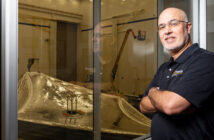Lehigh will host the Soaring Together celebration, beginning this August, to honor 50 years of undergraduate co-education at Lehigh.
Rather than hosting one event, Soaring Together will encompass a breadth of different events, programs and topics that amplify Lehigh’s inclusion efforts.
Janet Norwood, senior director for strategic messaging, said while the 40th anniversary focused more on the historical milestone of the admission of undergraduate women, this year the event hopes to expand as a more inclusive celebration of all Lehigh women.
Assistant vice president of Alumni Relations Jennifer Cunningham agreed with Norwood regarding inclusivity. The term “Soaring Together” relates to the idea that co-education benefits not only the female students, but the university as a whole.
“Having women who think differently about things just makes sense to me from a learning standpoint,” Cunningham said. “I think that the opportunities are not just for the women, but are for the men to learn how women think, and to try and benefit from that.”
Norwood said by the 1970s, demographics were shifting and universities recognized that admitting women would increase the pool of talent.
“Just thinking about women of Lehigh, especially the ones that entered 50 years ago to an all-male environment, I can only imagine how gritty and get ‘er done that class of women had to be,” Cunningham said.
Mardi Blacher-Reich, ‘75, and Karen Stuckey, ‘75, were both members of the first undergraduate class of women at Lehigh. When they arrived in 1971, Stuckey said the university’s male to female ratio was 32:1.
Prior to her arrival at Lehigh, Blacher-Reich said the female students attended an orientation describing what the male Lehigh students were like.
At this orientation, Blacher-Reich said the women were told that male students may resent their presence, given they had signed up for an all-male institution.
She was told that engineers would be “mostly shy and very studious” and that they “may not feel comfortable with women and may not even (maintain) eye contact.”
With a lack of dorm security and safety measures in place, Blacher-Reich said that there were also several issues of sexual misconduct with no easily accessible reporting method.
She said the classroom environment was also in flux, as much of the course material hadn’t been adapted for a co-ed student body. She recalled the discomfort of reading a sexual poem in literature class, where she was one of two girls in the room.
Blacher-Reich said she witnessed progress over her time at Lehigh.
As a Gryphon, she witnessed the transition of female students from being more reliant on each other to becoming confident and independent in their personal and academic endeavors.
“Every year, I think women became more serious about their careers,” Blacher-Reich said. “It wasn’t just ‘Marry the Lehigh guy,’ it was ‘Maybe marry a Lehigh guy but also have your own career.’”
Stuckey, who went on to become the first female audit partner in the New York office of Price Waterhouse, said her experience at Lehigh prepared her for the experience.
“Price Waterhouse was co-ed compared to Lehigh, so I think I was very prepared to break that ground,” Stuckey said. “Lehigh had prepared me to be the only woman in many situations.”
Stuckey said the experience has made her graduating class especially involved in the Lehigh community, and that the class of 1975 has continued to have a disproportionate number of trustees.
Despite the changes Lehigh has undergone since admitting the class of 1975, Stuckey said there can still be more positive change.
“I’m hoping to see the current classes appreciate the changes that Lehigh’s made, and also understand where more could be done,” Stuckey said.
Blacher-Reich said she hopes the celebration will do more than just applaud growth and will alternatively spark necessary conversations.
“We know that it’s not all sunshine and roses when it comes to the history of the university, or gender equity or social justice,” Norwood said. “We hope that this celebration is more than just the cake and the toast, and that there’s the opportunity to have some difficult conversations, to look at the ways things are now and how we might change them and where we might be going in the future.”






Comment policy
Comments posted to The Brown and White website are reviewed by a moderator before being approved. Incendiary speech or harassing language, including comments targeted at individuals, may be deemed unacceptable and not published. Spam and other soliciting will also be declined.
The Brown and White also reserves the right to not publish entirely anonymous comments.